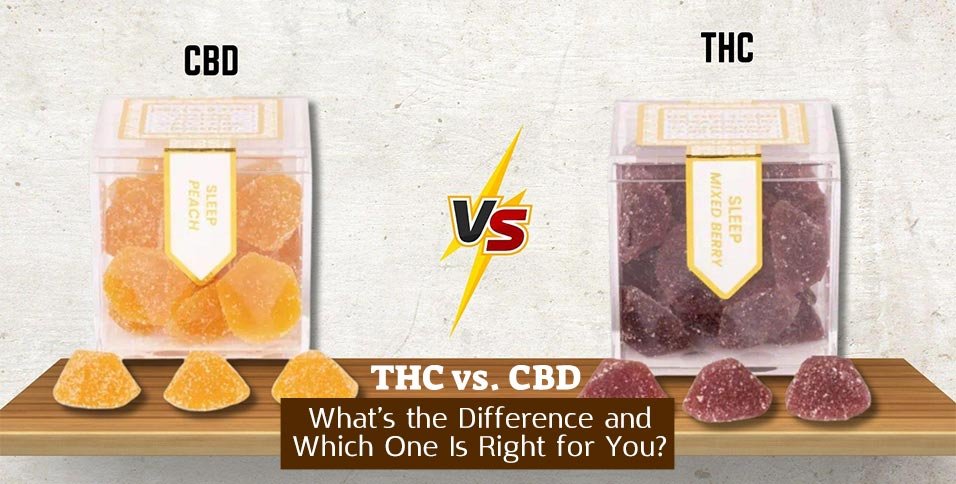Cannabis is gaining popularity for its wellness and medicinal benefits. The plant produces over 100 compounds, but the most well-known are THC (tetrahydrocannabinol) and CBD (cannabidiol). These compounds serve different purposes and offer unique effects. Its compounds promise benefits for pain relief, anxiety, and more. Among these, THC (tetrahydrocannabinol) and CBD (cannabidiol) stand out as the most well-known. Both offer unique effects and uses.
THC and CBD are not just popular—they are transformative for many individuals seeking natural relief. Cannabis is being used for pain management, anxiety, stress reduction, and even chronic conditions like epilepsy and arthritis. However, THC and CBD differ significantly in their effects, uses, and legal status.
In this guide, we will break down the key differences between THC and CBD. By the end, you will better understand which compound aligns with your needs and how to make an informed decision while choosing THC or CBD.
What is THC?
THC is the main psychoactive compound in cannabis. It is responsible for the “high” sensation that people commonly associate with marijuana. THC interacts with the body’s endocannabinoid system, which plays a role in regulating mood, pain, and other bodily functions. When THC binds to receptors in the brain, it can create a sense of euphoria or altered consciousness.
THC is often used for its relaxing and mood-boosting effects. It may help with pain relief, appetite stimulation, and managing nausea, especially in those with chronic conditions such as cancer or HIV. However, THC can also cause side effects, such as memory issues, anxiety, and paranoia, but particularly when consumed in high doses.
THC interacts with the brain’s CB1 receptors in the endocannabinoid system. This interaction impacts mood, memory, and appetite. Different products like marijuana flowers, edibles, and oils contain varying levels of THC. These products may be available legally depending on your location. Weed gummies provide a convenient and enjoyable way to consume THC for these benefits. They are popular for their controlled dosage and easy use.
THC is a controlled substance under U.S. federal law but is legal
in several states for recreational or medical use. Always check local regulations before purchasing THC products.
What is CBD?
CBD is another cannabinoid found in cannabis, but unlike THC, it is not psychoactive. This means CBD does not cause the “high” feeling typically associated with marijuana use. CBD is present in both marijuana and hemp, but hemp-derived CBD is more widely used and accepted.
CBD interacts with the body’s endocannabinoid system differently than THC. It mainly influences receptors outside of the brain, promoting a sense of calm and relaxation without affecting the mind.
CBD is commonly used for its therapeutic effects. It has shown promise in managing anxiety, chronic pain, sleep disorders, and even epilepsy. Unlike THC, CBD is considered safe for most people with minimal side effects. In rare cases, some individuals may experience mild symptoms such as drowsiness or dry mouth.
CBD interacts indirectly with CB1 and CB2 receptors in the endocannabinoid system. It provides benefits like reducing anxiety, inflammation, and seizures without altering perception.
CBD products include oils, topicals, capsules, and edibles.Hemp-derived CBD with less than 0.3% THC is federally legal in the U.S. but still faces state-level restrictions.
What Are the
Differences Between THC and CBD?
Here are the key differences between THC and CBD:
- THC and CBD Differ in Psychoactive Effects
THC
THC is the psychoactive compound in cannabis. It interacts with the brain’s CB1 receptors, leading to a sense of euphoria, altered perception, and sometimes, a “high.” THC’s mind-altering effects can include heightened sensory experiences and altered time perception. In higher doses, THC may cause anxiety, paranoia, and confusion in some users.
CBD
CBD is non-psychoactive. It does not cause a high or impair mental clarity. CBD interacts with both CB1 and CB2 receptors, but in a more subtle way. This interaction helps to promote relaxation and reduce stress without altering your mental state or impairing cognitive functions.
- They have different legal status
THC
THC is still considered a controlled substance under federal law in many countries, including the United States. However, it is legal in some regions for medical and recreational use. The laws regarding THC vary by state or country, with some allowing it for medicinal purposes and others permitting it for recreational use. Always check local regulations before using THC.
CBD
CBD, particularly hemp-derived CBD containing less than 0.3% THC, is federally legal in many countries, including the United States. It is widely accepted for its therapeutic benefits. However, local laws and regulations may vary, so it’s important to understand your region’s stance on CBD. In areas where THC is still illegal, CBD products are often available and accessible.
To navigate buying products in this legal grey area, purchase products from trusted brands to ensure safety and compliance. Only purchase the best disposable vapes, naturally grown cannabis flower with minimal pesticides, and gummies with healthy ingredients that are Best Disposable Vape – TribeTokes low in sugar. Always check lab tests before consuming a cannabis product.
- They have different medicinal benefits
THC
THC offers strong medical benefits, especially for pain management and appetite stimulation.
- Pain Relief: THC is effective in managing chronic pain from conditions like arthritis, cancer, and migraines. It works by interacting with the endocannabinoid system to reduce pain perception.
- Appetite Stimulation: THC is particularly useful for those suffering from appetite loss, such as individuals undergoing chemotherapy or dealing with eating disorders.
- Nausea Reduction: THC can reduce nausea and vomiting, especially in chemotherapy patients, making it a valuable tool for cancer treatment support.
CBD
CBD provides medical benefits without the psychoactive effects of THC.
- Anxiety Relief: CBD is known for its calming effects on the nervous system. It helps reduce anxiety and stress without impairing cognitive function.
- Anti-inflammatory Properties: CBD is effective in reducing inflammation, making it ideal for treating conditions like arthritis and skin disorders.
- Seizure Control: CBD has gained widespread attention for its ability to reduce seizures in individuals with epilepsy. The FDA-approved drug Epidiolex uses CBD to treat certain seizure disorders.
- Pain Relief: Although not as potent as THC, CBD offers mild pain-relieving benefits, particularly for conditions like back pain, headaches, and joint pain. Items like CBD gummies for pain are popular for full body relief to regulate pain perception, while a topical like a CBD pain cream can be better for more targeted relief in a specific area.
4. They have different side effects
THC
While THC is effective for pain relief and relaxation, it comes with several potential side effects.
- Paranoia and Anxiety: Some people experience heightened anxiety or paranoia, especially with higher doses of THC.
- Dry Mouth: THC can reduce saliva production, leading to a dry mouth, commonly referred to as “cottonmouth.”
- Increased Heart Rate: THC may increase heart rate, which can be uncomfortable or alarming for some users.
- Memory and Cognitive Impairment: THC affects short-term memory and cognitive functions, which can make tasks like driving or focusing more difficult.
CBD
CBD is generally well-tolerated, but some users may experience mild side effects.
- Drowsiness: CBD can have a calming effect, which may lead to drowsiness or fatigue, especially in higher doses.
- Dry Mouth: Similar to THC, CBD can also cause dry mouth, though this side effect is usually less intense.
- Drug Interactions: CBD can interact with certain medications, particularly those metabolized by the liver. Always consult with a healthcare provider before using CBD, especially if you’re on prescription medications.
What Are the Benefits of THC and CBD?
Both THC and CBD provide unique advantages. Choosing the right compound depends on your specific needs.
Benefits of THC
THC offers potent relief for various conditions.
- Chronic Pain Relief: THC is highly effective in managing pain related to conditions like arthritis, cancer, or multiple sclerosis.
- Appetite Stimulation: THC helps increase appetite, especially beneficial for those undergoing chemotherapy or struggling with eating disorders.
- Sleep Aid: THC has sedative effects, making it a popular choice for those with insomnia or other sleep disorders. Indica gummies are a good option for sleep and relaxation, as they provide calming effects.
Benefits of CBD
CBD is best for those seeking non-intoxicating relief.
- Anxiety Reduction: CBD can help reduce anxiety, making it ideal for those with generalized anxiety disorder or social anxiety.
- Anti-inflammatory Benefits: CBD is widely used for treating inflammatory conditions like arthritis or acne due to its strong anti-inflammatory properties.
- Seizure Control: CBD is especially beneficial for individuals with epilepsy. The FDA-approved Epidiolex is a prime example of CBD’s effectiveness in seizure reduction.
- Skin Health: CBD helps with acne and other inflammatory skin conditions due to its ability to reduce oil production and inflammation in the skin.
Which One Is Right for You?
Here is how you can decide which one to choose:
When Should You Choose THC?
THC is ideal for those who need strong pain relief, appetite stimulation, or relaxation.
- For Pain Relief: THC is highly effective for those with chronic pain conditions such as cancer, arthritis, or multiple sclerosis.
- For Appetite Stimulation: THC is perfect for individuals dealing with appetite loss due to chemotherapy or eating disorders.
- For Strong Relaxation: THC’s psychoactive effects make it great for relaxation and stress relief, especially for users in areas where THC is legal.
When Should You Choose CBD?
CBD is better for those seeking relief without the psychoactive effects.
- For Anxiety or Stress: CBD is perfect for those looking for natural anxiety relief without altering mental clarity.
- For Mild Pain Relief: CBD offers gentle pain relief, especially for those with mild to moderate pain.
- For Skin Conditions: CBD’s anti-inflammatory properties make it a good choice for treating acne, eczema, and other inflammatory skin issues.
- For Seizure Control: CBD is effective for controlling seizures in individuals with epilepsy and other seizure disorders.
Can You Combine THC and CBD?
Some prefer THC and CBD together. Combining THC and CBD offers a balanced effect, known as the entourage effect. This theory suggests they work better together
than alone. Products like 1:1 THC-to-CBD ratio oils provide balanced benefits. These products are ideal for users looking for moderate relief with less intoxication.
How to Use THC and CBD Safely
Safe use of THC and CBD ensures effective results without risks. Follow these guidelines:
·
- Start with small doses and increase gradually to find the right amount.
- Consult a healthcare provider, especially if taking other medications.
- Choose products with clear labeling and third-party testing for purity.
- Avoid using THC or CBD if pregnant or breastfeeding unless advised by a doctor.
Conclusion
THC and CBD serve different purposes. THC is ideal for stronger relief and relaxation, while CBD offers wellness benefits without intoxication. Your choice depends on your needs, tolerance, and legal considerations.
Always start with a healthcare consultation. Explore trusted
options, and choose products that align with your health goals. Combining THC
and CBD can offer enhanced benefits, but safety and compliance should always come first.
Also Read: How Innovations in CBD Products are Revolutionizing Wellness in the Workplace









